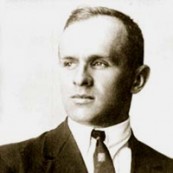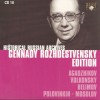Biography
Leonid Alexeyevich Polovinkin (Kurgan, 13 Aug 1894 - Moscow, 8 Feb 1949) was a Russian composer. He was a leader of Russian modernism in the mid-1920s.
In 1914, he entered the Moscow Conservatory, graduating a decade later, and began two years of post-graduate work. He then taught orchestration and analysis at his alma mater for six years before joining the Moscow Central Children’s Theater as music director. The latter position was to become the centerpiece of his career.
Like several other young composers of the pre-Revolutionary period, Polovinkin contracted a case of Scriabinitis. At its best, the music produced under its influence demonstrated a fevered intensity; at its worst, the results were recondite, rambling pieces, a bracelet linking momentary effects with little coherence. In Events, a pair of short movements from 1922, the chromatic gestures and figures overwhelm the content. By the Piano Sonata No. 4 of 1927, there are more flashes of talent in the musical neurasthenia, notably in the short bitonal, chromatic second movement, with hints of both pointillism and jazz.
Like Roslavets, Polovinkin was an active member of the radical Association for Contemporary Music (ACM), and even created several “collectivist” works—such as The Four Moscows, with Mosolov, Alexandrov, and Shostakovich, and a symphonic Prologue with Mosolov, Roslavets, and Shostakovich. The New Grove suggests that he was heavily criticized in the press and “in his later period . . . turned to a simpler, folksong-like style,” yet there’s nothing that gives this impression in the later piano music on this disc, though it stops at 1937. Perhaps his four string quartets or final symphonies of the 1940s demonstrate these qualities.







